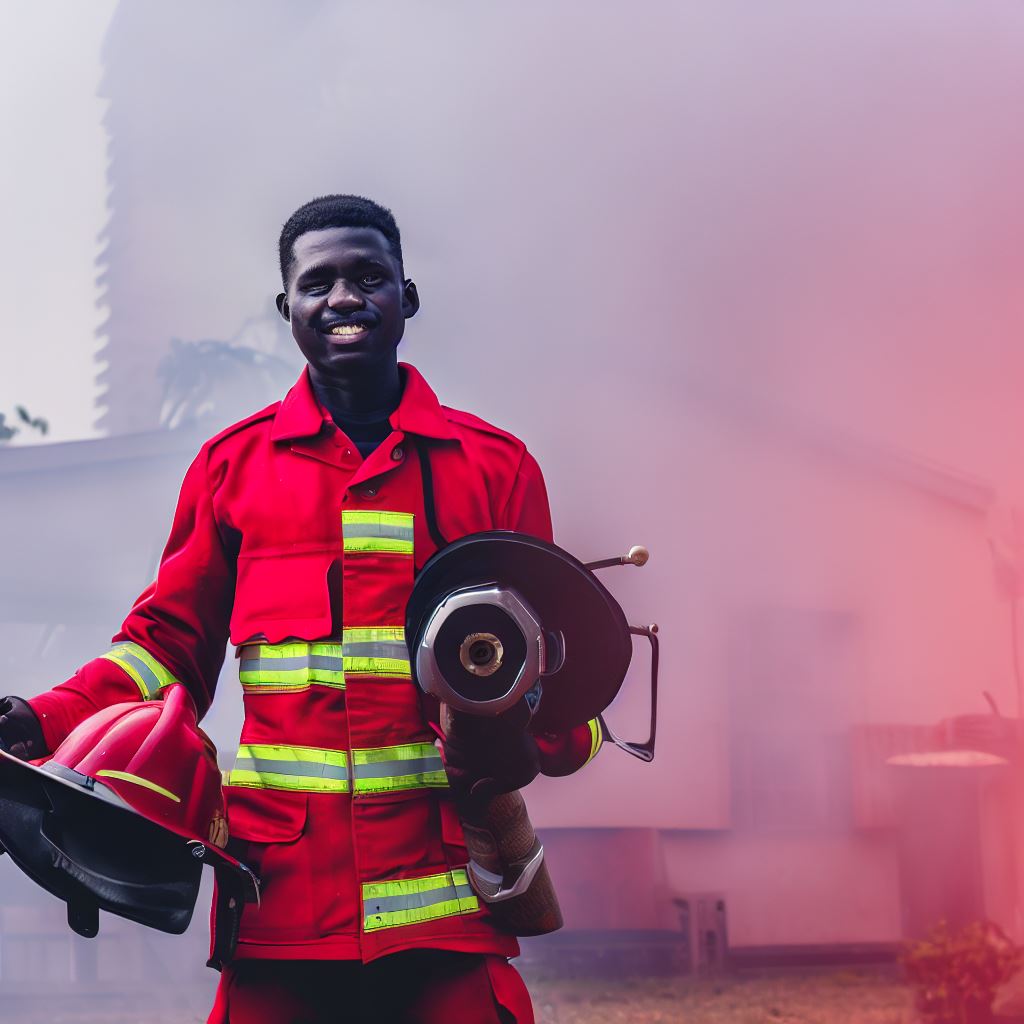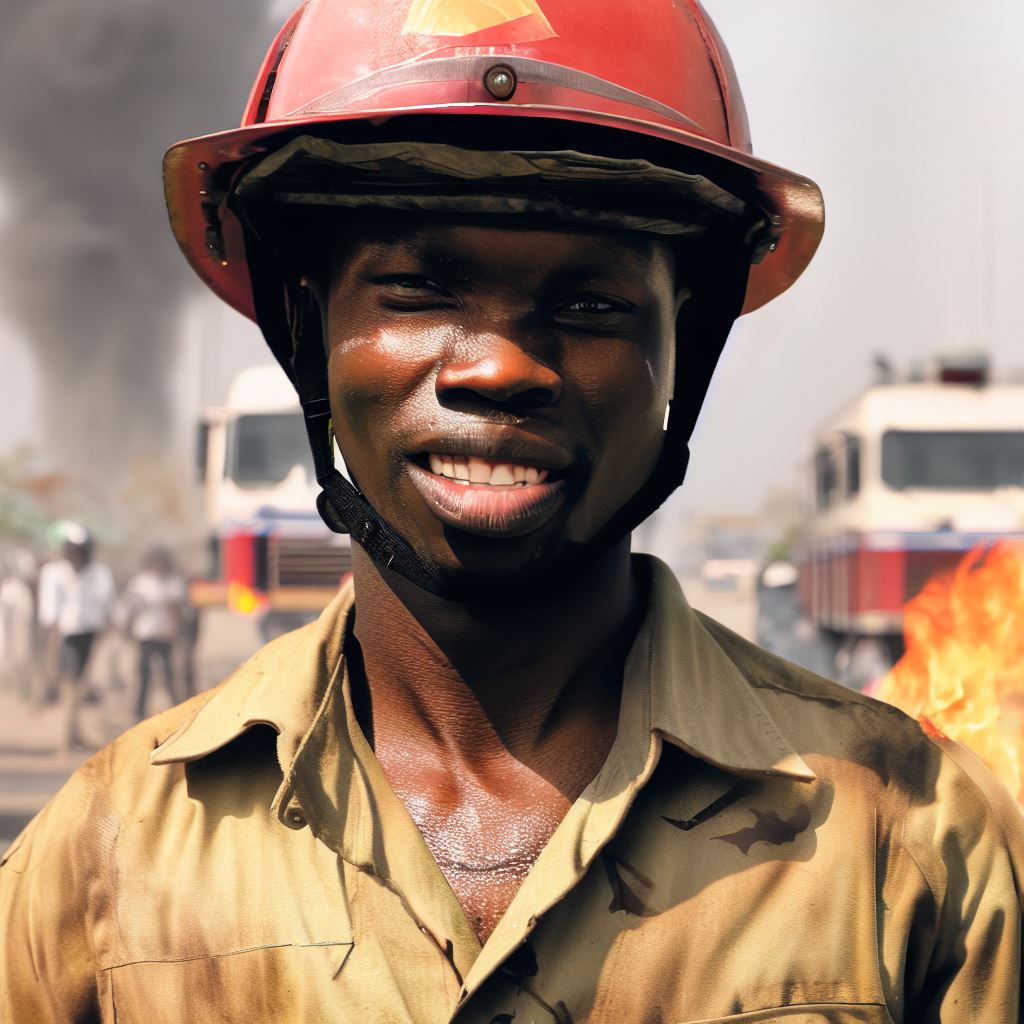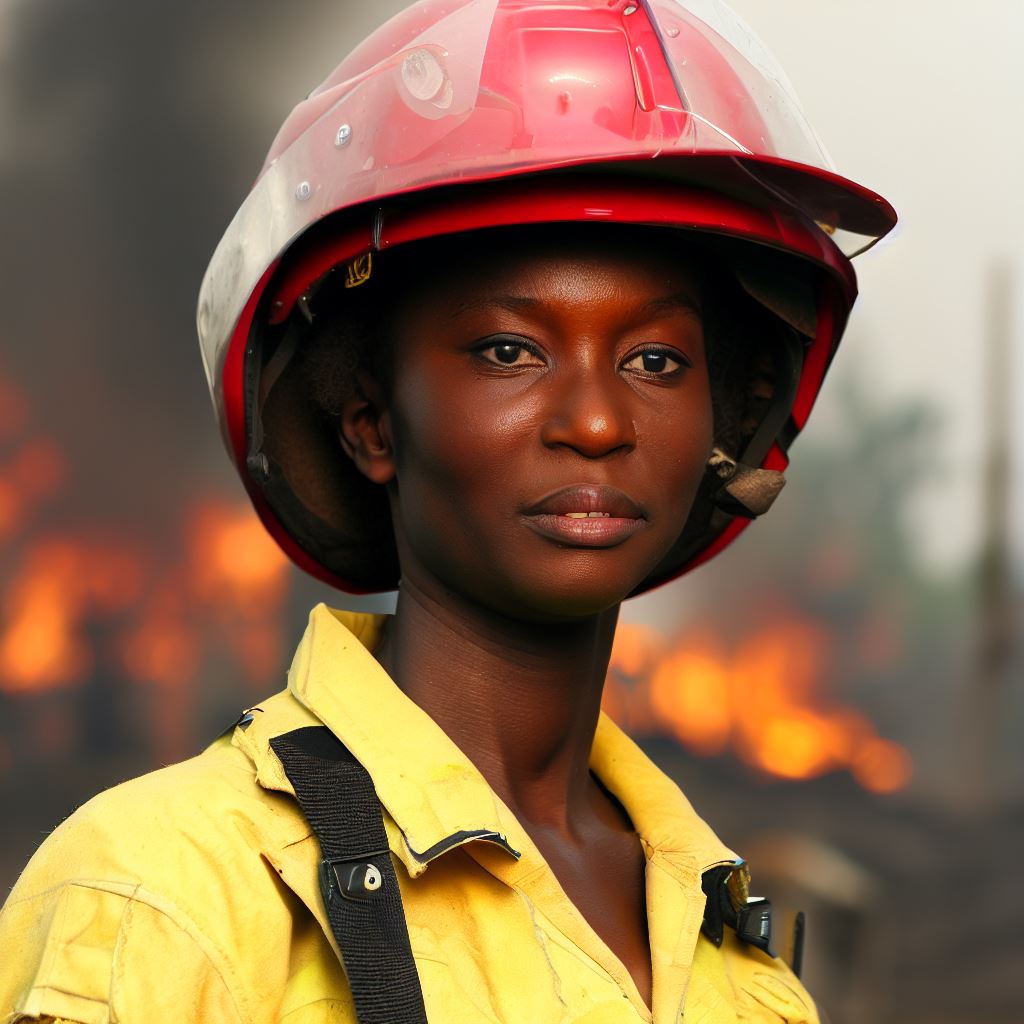Introduction
Ensuring fire safety is paramount, safeguarding both lives and property.
At the forefront of this mission stand our dedicated firefighters, unsung heroes in the battle against blazes.
In this blog post, we delve into the unique challenges and contributions of these brave individuals within the context of Nigeria.
In a nation marked by diverse landscapes and climates, Nigerian firefighters face distinctive obstacles.
They combat not only structural fires but also those in densely populated urban areas and remote rural regions.
With limited resources, they exhibit unmatched resilience and resourcefulness, exemplifying unwavering commitment to safeguarding their communities.
Join us on a journey to explore the remarkable role played by these courageous firefighters in Nigeria.
History of Fire Fighting in Nigeria
A. The origin and development of fire fighting in Nigeria
- Fire fighting in Nigeria dates back to ancient times.
- Indigenous communities had their own methods of dealing with fires.
- These methods included using local resources like water, sand, and earth.
- Traditional firefighting techniques were passed down through generations.
- With colonization, firefighting techniques evolved and were formalized.
B. Major milestones and improvements over the years
- The establishment of the Lagos State Fire Service in 1892.
- This marked the beginning of professional firefighting in Nigeria.
- Improved equipment and training were introduced over time.
- The Nigerian Fire Service was created in 1901 under the colonial government.
- Fire stations were set up in major cities across the country.
- Firefighters became more organized and equipped with modern tools.
- The Fire Service Act of 1963 provided legal framework and standards.
- The introduction of fire trucks, hoses, and extinguishers improved firefighting capabilities.
C. The current state of fire safety in the country
Despite the progress made, fire safety in Nigeria still faces challenges:
- Lack of adequate funding and resources for fire departments.
- Inadequate training and insufficient personnel in some areas.
- Urbanization and population growth have increased fire risks.
- Building regulations and enforcement need improvement.
- Highly flammable building materials contribute to fire outbreaks.
- Low awareness and public education about fire safety.
- Limited access to modern firefighting equipment in rural areas.
The current state of fire safety in Nigeria requires urgent attention and improvement.
Efforts should be made to:
- Allocate more funding and resources to fire departments.
- Enhance training for firefighters and increase personnel in underserved areas.
- Strengthen building regulations and enforcement to prevent fire hazards.
- Promote the use of non-flammable building materials.
- Launch public campaigns to raise awareness about fire safety.
- Ensure availability of modern firefighting equipment across the country.
- Establish partnerships between government agencies and private sectors.
Elevating fire safety in Nigeria will protect lives, properties, and contribute to national development.
Challenges Faced by Nigerian Fire Fighters
A. Lack of Modern Equipment and Technology
- Nigerian Fire Fighters often face challenges due to the lack of modern firefighting equipment.
- Outdated equipment and technology make it difficult for them to effectively combat fires.
- The absence of specialized equipment and tools hampers their ability to carry out their duties efficiently.
- Inadequate access to fire trucks, hydrants, and other essential equipment hinders their response time.
- The lack of modern fire safety technology like smoke detectors and fire alarms poses a significant challenge.
B. Insufficient Training and Inadequate Funding
- Nigerian Fire Fighters face challenges due to insufficient training programs provided to them.
- Inadequate training prevents these firefighters from gaining the necessary skills to handle complex fire incidents.
- The lack of funding allocated for training programs limits their ability to keep up with evolving fire safety techniques.
- The absence of regular training sessions hampers their ability to stay updated with advanced firefighting methods.
- The inadequate funding also affects their capacity to maintain and repair firefighting equipment.
C. Issues Related to Fire Prevention Education and Public Awareness
- The lack of fire prevention education in Nigerian communities poses a significant challenge for firefighters.
- Insufficient public awareness about fire safety leads to a higher occurrence of fire incidents.
- The absence of proactive fire safety measures and awareness campaigns contributes to increased risks.
- Nigerian Fire Fighters struggle to spread awareness about fire safety practices and proper evacuation procedures.
- Limited resources and support for fire prevention initiatives hinders their ability to educate the public effectively.
In fact, Nigerian Fire Fighters face numerous challenges associated with the lack of modern equipment and technology, insufficient training, inadequate funding, and limited fire prevention education.
These barriers significantly impact their ability to protect lives and property during fire emergencies.
It is crucial for the Nigerian government and relevant authorities to address these issues and provide better resources, training, and public awareness to support the essential role of fire fighters in ensuring safety across the country.
Read: Local Perspectives: Interviews with Nigerian Coating Experts
Duties and Responsibilities of Nigerian Fire Fighters
A. The primary role of fire fighters in emergency response
- Respond quickly to emergency calls and efficiently extinguish fires to protect lives and property.
- Conduct search and rescue operations to locate and save individuals trapped in hazardous situations.
- Provide immediate medical assistance to the injured at accident scenes or during emergencies.
- Assess the situation and employ appropriate tactics to control and manage hazardous materials incidents.
B. Their involvement in various activities such as rescue missions and first aid
- Engage in rescue missions to extricate individuals from collapsed buildings or vehicle accidents.
- Administer first aid and basic life support techniques to stabilize patients before transferring them to medical facilities.
- Operate specialized equipment like Jaws of Life, ropes, and harnesses to perform rescues from heights or confined spaces.
- Assist in traffic control to ensure the safety of responders, victims, and the general public during emergencies.
C. The importance of fire prevention initiatives undertaken by fire fighters
- Educate the public through awareness campaigns about fire safety practices and preventive measures.
- Conduct building inspections to identify potential fire hazards and enforce compliance with fire codes and regulations.
- Train and advise businesses and individuals on fire prevention strategies, including proper handling and storage of flammable materials.
- Install and maintain fire alarm systems, sprinkler systems, and fire extinguishers to minimize the risk of fire outbreaks.
In Nigeria, the brave men and women who serve as firefighters are unsung heroes.
Despite the perilous nature of their work, they stand undeterred in the face of danger, dedicated to safeguarding lives and property.
Their primary mission is swift response to emergency calls and effective fire suppression.
They go beyond, though, conducting daring rescue missions and providing critical medical aid.
Their actions often mean the difference between life and death for those trapped or injured.
But their role doesn’t end there. Firefighters are proactive in fire prevention, educating communities, and enforcing safety codes.
They also ensure that essential fire safety systems are in place and functional.
In essence, Nigerian firefighters are indispensable pillars of emergency response and community safety.
Read: How Sports Massage Therapy is Changing Athletics in Nigeria

Collaborations and Partnerships in Fire Safety
A. Collaborations with Other Stakeholders
- Nigerian fire fighters actively collaborate with various stakeholders in enhancing fire safety measures.
- They work closely with government agencies, such as the National Emergency Management Agency (NEMA).
- Collaboration with NEMA allows for streamlined response and coordination during fire emergencies.
- Fire fighters also partner with local communities and neighborhood associations to raise awareness about fire prevention.
- These collaborations involve organizing safety awareness campaigns and conducting training programs.
- By working together, fire fighters and stakeholders aim to minimize fire hazards and increase overall safety.
B. Partnerships with International Organizations and Foreign Fire Departments
- Nigerian fire fighters have established partnerships with international organizations specializing in fire safety.
- One such notable partnership is with the United Nations Development Programme (UNDP).
- Through this collaboration, fire fighters receive technical support, training, and access to modern firefighting equipment.
- Foreign fire departments from countries like the United States and United Kingdom also engage in partnerships.
- These partnerships facilitate knowledge sharing and provide valuable insights into advanced fire safety practices.
- International collaborations have brought in expertise and resources to enhance firefighting capabilities in Nigeria.
C. Impact of Collaborations on Fire Safety in Nigeria
- Collaborations with stakeholders have led to increased awareness and improved fire prevention strategies in Nigeria.
- By working together, fire fighters and stakeholders have successfully conducted safety drills and evacuation exercises.
- These efforts have significantly reduced the loss of life and property during fire incidents.
- Partnerships with international organizations have brought in advanced techniques and equipment for firefighting operations.
- Fire fighters now have access to modern technologies, such as thermal imaging cameras and specialized protective gear.
- The collaborations have also led to the establishment of fire safety standards and regulations in line with international practices.
- As a result, fire safety has become a priority consideration in the development and construction of public buildings.
- The impact of collaborations can be seen in the reduction of fire outbreaks and improved response times in Nigeria.
- Through joint efforts, fire fighters and partners continue to work towards enhancing fire safety practices and minimizing risks.
In general, collaborations and partnerships play a crucial role in improving fire safety in Nigeria.
Nigerian fire fighters actively engage with stakeholders, both domestically and internationally, to enhance their capabilities and preventive measures.
These collaborations have led to increased awareness, advanced firefighting techniques, and improved response times.
Together, fire fighters and stakeholders are committed to minimizing fire hazards and ensuring the safety of the Nigerian population.
Read: Legal Regulations for Sports Massage Therapists in Nigeria
Real-life Examples and Success Stories
A. Notable incidents displaying Nigerian fire fighters’ skills and bravery
- In 2019, fire fighters in Lagos successfully battled a major fire at Balogun market, preventing a widespread disaster.
- Last year, Nigerian fire fighters rescued several people trapped in a high-rise building engulfed in flames in Abuja.
- During the devastating pipeline explosion in Abule Egba, Lagos in 2020, fire fighters courageously controlled the fire and saved lives.
B. Success stories of fire prevention campaigns and initiatives
- The Fire Safety Enlightenment Program, launched in Lagos, educated citizens about fire safety measures and reduced fire incidents in residential areas by 30%.
- In collaboration with schools, Nigerian fire fighters conducted fire safety drills, leading to enhanced preparedness and swift evacuation during emergencies.
- The “Fire Fighters in Schools” initiative encouraged proactive fire safety practices, resulting in a significant decline in fire-related accidents in educational institutions.
C. Positive outcomes achieved by Nigerian fire fighters
- Nigerian fire fighters have continually demonstrated their commitment to saving lives, often risking their own in dangerous situations.
- Their prompt response and swift firefighting skills have prevented numerous fire incidents from escalating into major disasters.
- Through public awareness campaigns, fire fighters have educated citizens on fire prevention, reducing fire-related injuries and fatalities.
- Nigerian fire fighters have forged partnerships with other emergency services, fostering better coordination and improving overall response effectiveness.
- Efficient rescue operations by fire fighters have saved people from burning buildings, vehicle accidents, and other life-threatening situations.
- Fire fighters’ bravery and dedication have earned public praise, instilling confidence and trust in their abilities and professionalism.
These real-life examples and success stories highlight the invaluable role Nigerian fire fighters play in ensuring public safety and protection from fire emergencies.
Their skills, bravery, and proactive measures have not only saved lives but also contributed to the overall reduction of fire incidents.
By sharing these accomplishments, we recognize and appreciate the significant impact Nigerian fire fighters have in safeguarding communities and inspiring fire prevention awareness.
Read: How to Find Sports Massage Therapy Jobs in Nigeria: Tips
Uncover the Details: Training for Solar PV Installers in Nigeria
Recommendations for Improving Fire Safety in Nigeria
A. Increased Government Support and Funding
- Advocate for the Nigerian government to allocate more resources towards fire safety initiatives.
- Establish specialized firefighting divisions within the government with dedicated funding for equipment and training.
- Collaborate with international organizations to secure grants and financial aid for improving fire safety infrastructure in Nigeria.
- Create tax incentives or subsidies for businesses and industries that prioritize fire safety measures.
B. Updated Training and Modern Equipment
- Develop comprehensive training programs that cover modern firefighting techniques and hazard identification.
- Invest in state-of-the-art firefighting equipment, including advanced fire extinguishers, protective gear, and communication systems.
- Establish partnerships with international fire departments to exchange knowledge and expertise.
- Regularly update training materials and equipment to keep up with advancements in firefighting technology.
C. Stronger Fire Prevention Education and Public Awareness Campaigns
- Mandate fire safety education in schools, covering basic fire prevention measures and emergency response protocols.
- Collaborate with media outlets to raise public awareness about fire safety through television, radio, and social media campaigns.
- Organize community seminars and workshops on fire prevention, evacuation procedures, and the importance of smoke alarms.
- Engage with local communities and traditional leaders to promote fire safety practices and establish neighborhood watch programs.
Implementing these recommendations can significantly enhance fire safety in Nigeria and protect lives and properties.
It requires a collective effort from the government, communities, and individuals to prioritize fire prevention and response measures.
Learn More: Advancements in Bus Technology: Nigeria’s Transit Leap
Conclusion
Nigerian fire fighters hold a significant responsibility in safeguarding the community and minimizing the risks posed by fire incidents.
Their prompt response to emergencies and proactive measures in preventing fire outbreaks are commendable.
Fire safety is of utmost importance as it not only protects lives but also safeguards property and prevents environmental damage.
Therefore, it is crucial for individuals to prioritize fire prevention in their everyday lives.
Regularly inspecting and maintaining fire safety equipment, such as fire extinguishers and smoke detectors, can save lives in the event of an emergency.
Additionally, conducting fire drills and educating family members on safety procedures should be a priority.
Furthermore, the government should ensure that fire departments have adequate resources, such as modern equipment and training facilities, to effectively carry out their duties.
Allocating sufficient funds to fire departments will enable them to respond swiftly and efficiently to emergencies, thereby reducing potential damages.
In light of the significance of fire safety, a collective effort is required to protect lives and properties.
Citizens must take individual responsibility for fire prevention, and the government should champion this cause by implementing policies that prioritize fire safety measures.
Together, we can create a safer environment by preventing fire incidents and minimizing their impact. Let us all join hands in making fire safety a top priority for the well-being of our society.




